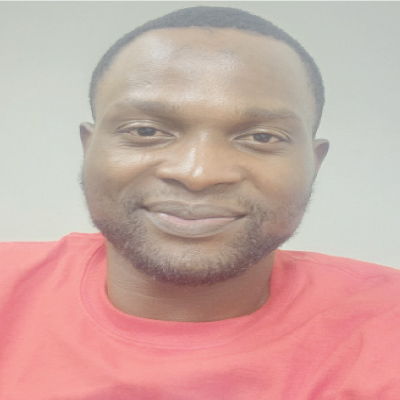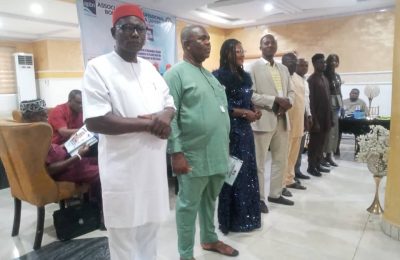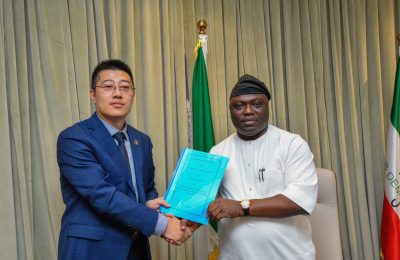Raymond Aderoju graduated from the Department of Geology, Federal University of Technology Akure with a First Class. He recently got a scholarship to study Geology at the University of Georgia (UGA), United States. In this interview by AWAU ADEGOKE, he speaks about his scholarship application process, and his academic journey at UGA, among others.
Congratulations on your master’s scholarship to study at the University of Georgia, United States. How did this feat make you?
I am deeply grateful for this opportunity. I attribute my success to God’s guidance and grace. Achieving this scholarship fills me with immense pride and excitement, reflecting the dedication and hard work that has brought me to this point. My family has been a pillar of support throughout my journey, always believing in my potential and encouraging me every step of the way. My undergraduate university is equally proud, as this accomplishment highlights its commitment to producing graduates who excel on a global stage and uphold the institution’s reputation. They trust that I will continue to uphold and represent their standards with excellence.

How did you secure the scholarship?
Securing the scholarship was a well-planned and strategic process that took me about two to three years of preparation, starting in 2021. I utilised the periods during the COVID-19 lockdown (2021) and the ASUU strike (2022) to thoroughly research and understand the US graduate school application process. I watched instructional videos on YouTube, connected with graduate students on LinkedIn, and noted all necessary information in a notebook, including requirements and useful links, to streamline the application process when the time comes.
In 2022, I began conducting research in my area of expertise, collaborating with my friend and mentor Taiwo Blessing, and then published my first paper in March 2023. By the end of that year, I had published three additional research papers. Following my graduation in April 2023, I remained committed to the scholarship application process, dedicating approximately 10 hours each day to crafting a competitive application package. This included preparing a comprehensive academic CV, reaching out to potential supervisors through cold emails, obtaining my university transcript (where I graduated with first-class honours as the best student in my cohort), and drafting my statement of purpose, research statement, and cover letters. My undergraduate professors also provided recommendation letters to support my application.

Over the course of eight months, from April 2023 to January 2024, I put effort into perfecting my application. I applied to five universities and was ultimately awarded full scholarships to the University of Georgia and Kansas State University. It was a rigorous and demanding process, but the outcome was truly rewarding.
In your LinkedIn post, where you announced your scholarship feat, you stated that “These accomplishments were made possible by the education and upbringing I received at FUTA, which shaped me into the person I am today.” Could you shed more light on this — especially, how it relates to the scholarship?
It is no exaggeration to say that FUTA is one of the best institutions in Nigeria, not only because of its academic rigour but also its focus on equipping students with the skills to solve real-world problems. The mentorship I received from experienced lecturers, along with my participation in professional development programmes and seminars, contributed significantly to my academic and personal growth. Moreover, FUTA’s emphasis on discipline, character building, and strong industry connections gave me practical exposure and instilled a sense of professional responsibility. This relates directly to my scholarship, as the process of applying for scholarships, especially in the US, is rigorous and often involves setbacks. The training and resilience I developed at FUTA gave me the perseverance needed to navigate and overcome the challenges during the application process.
Geology has many areas of specialisation. Which area are you majoring in in the master’s programme?
For my master’s programme, I am specialising in Carbon Sequestration. This field is vital for addressing climate change, as it focuses on capturing and securely storing CO2 in appropriate geological formations, such as depleted oil and gas reservoirs or deep saline aquifers. By ensuring the safe and long-term storage of CO2, we can significantly reduce greenhouse gas emissions and mitigate their impact on the environment. My goal is to contribute to this critical area of research, developing innovative and sustainable solutions that leverage geological expertise to combat climate change effectively.
What do you intend to work on for your thesis? Would it be a Nigerian-based problem?
For my thesis, I plan to develop hybrid models that integrate numerical simulations, machine learning, and pore-scale geophysical modelling to predict multiphase flow (CO2 and groundwater) and transport in complex porous media. I aim to use geological techniques to study the behaviour of CO2 when it is injected into subsurface geological formations, with a focus on optimising the storage processes to ensure they are safe and efficient. This research is not limited to addressing Nigeria-based problems but also tackles critical global challenges related to climate change.
What do you think the Geology Department at FUTA could emulate from that at Georgia to make learning and research easier for students and staff at FUTA?
Comparing the Geology Department at FUTA to that of the University of Georgia (UGA) is somehow, given the differences in resources and infrastructure between Nigeria and the United States. Many American universities, including the UGA, have access to advanced learning facilities and equipment that significantly enhance teaching and research. These resources are typically provided through substantial government funding and research grants, which allow lecturers to establish well-equipped individual laboratories.
In contrast, Nigerian institutions, including FUTA, often face constraints in accessing such resources. It is not about the capability or willingness of the lecturers, but rather the availability of funding and government support.
If the Nigerian government could invest more in providing state-of-the-art equipment, facilities, and research grants, it would create an environment where departments like Geology at FUTA could thrive even further. The dedication and expertise of the lecturers are already in place; what is needed is the necessary support to make learning and research easier and more impactful for students and staff.
What are your long-term career goals, and how do you think your master’s programme would help you achieve them?
My long-term career goal is to become a leading researcher and expert in the field of hydrogeology and carbon capture, storage, and utilisation (CCSU). After completing my master’s programme, I plan to pursue my PhD to deepen my expertise and contribute to advancing knowledge in this area.
Additionally, I aspire to collaborate with international organisations and governments to implement sustainable and practical strategies for climate change mitigation. Ultimately, I envision playing a role in policy development and environmental consulting, contributing to global efforts to reduce greenhouse gas emissions. The exposure to advanced modelling techniques and hands-on experience in my current programme would be instrumental in preparing me for my PhD and future professional endeavours.
Relocating to the United States for the first time may pose some weather, cultural, academic and other challenges. How are you coping with these changes and challenges?
Challenges are an inevitable part of life, and relocating to the United States came with its own set of adjustments. However, I embraced these challenges, and having a strong community of African and Nigerian students here has been incredibly helpful. They offered support and guidance, making my adaptation process much smoother.
One of the initial challenges I faced was the food, as it was quite different from what I was used to. Sometimes the meals were either overly salted or lacked salt entirely. Finding an African store nearby was a relief — it allowed me to prepare familiar meals. Academically, the learning style here is distinct from what I experienced back home. It involves a blend of class presentations, paper reviews, class participation, problem sets, assignments, and quizzes, rather than just tests and exams. I am still adjusting to this comprehensive approach. However, I am gradually adapting and improving.
Language was another challenge. Initially, I struggled to understand the fast pace of conversations and lectures. To cope, I recorded lectures and replayed them at home. Fortunately, after a couple of weeks, I became accustomed to the pace and stopped needing the recordings. As for the cultural aspect, I have not faced any significant difficulties. I focus on my goals and remain open-minded, which has helped me integrate smoothly.
Does your scholarship or programme allow you to work?
The scholarship includes an assistantship that allows me to work within the academic department. I am currently teaching laboratory instruction to undergraduate students and conducting research for 20 hours each week, as specified in my offer letter. Given the restrictions on work hours for international students, I can only work for 20 hours per week. In addition to my academic responsibilities, I have participated in conferences and workshops since my arrival. These events have provided valuable insights into the research being conducted by others, allowing me to identify connections and contrasts with my research.
Furthermore, it has enabled me to network with industry professionals, fostering relationships that could be pivotal for my future career development.
What advice would you give to Nigerian students who are considering studying in the United States?
My advice to Nigerian students aspiring to study in the United States is to remain committed to their studies and strive for academic excellence. School is not a scam — if it were, I would not have made it here today. Academic excellence is crucial, as most US institutions require a minimum CGPA of 3.0 on a 4.0 scale, while Ivy League and other top-tier schools often expect a CGPA of 3.5 or higher. So, it is important to aim for the best grades possible, ideally a First Class.
However, it is crucial to note that securing a scholarship is not solely about having a high CGPA. It also demands perseverance, strategic preparation, and a readiness to handle the rigorous application process. In my case, despite graduating with a First Class, I approached my application as if I had a lower grade, ensuring that I strengthened my profile with relevant research experience, technical skills, and other experiences.
I encourage students to engage in research and volunteer activities, and develop technical skills relevant to their field of study, as these experiences will not only enhance their scholarship applications but also prepare them for the demands of academic life in the US.
Lastly, students should familiarise themselves with the scholarship application process while still in school. This preparation will give them a significant advantage when the time comes to apply.
After your master’s programme in the United States, would you return to Nigeria to work or lecture? Where do you see yourself and your career in five years?
In five years, I envision myself pursuing a PhD while working as a researcher, focusing on innovative solutions for CO2 sequestration. My goal is to collaborate with local institutions and international organisations to implement effective strategies for climate change mitigation.
While I am open to opportunities globally, I intend to leverage my expertise to positively impact Nigeria and the broader international community by contributing to policy development and environmental consulting. My long-term vision is to play a key role in reducing greenhouse gas emissions, advancing sustainable development practices, and making a tangible difference in addressing the climate crisis.
READ ALSO: Nigeria’s hunger crisis deepens with 33 million at risk







